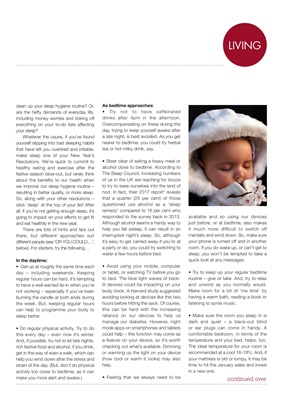
KITLIVING
continued over
clean up your sleep hygiene routine? Or,
are the hefty demands of everyday life,
including money worries and ticking off
everything on your to-do lists affecting
your sleep?
Whatever the cause, if you've found
yourself slipping into bad sleeping habits
that have left you overtired and irritable,
make sleep one of your New Year's
Resolutions. We're quick to commit to
healthy eating and exercise after the
festive season blow-out, but rarely think
about the benefits to our health when
we improve our sleep hygiene routine -
resulting in better quality, or more sleep.
So, along with your other resolutions -
stick 'sleep' at the top of your list! After
all, if you're not getting enough sleep, it's
going to impact on your efforts to get fit
and eat healthily in the new year.
There are lots of hints and tips out
there, but different approaches suit
different people (see 'OR YOU COULD…',
below). For starters, try the following…
In the daytime:
• Get up at roughly the same time each
day - including weekends. Keeping
regular hours can be hard. It's tempting
to have a well-earned lie-in when you're
not working - especially if you've been
burning the candle at both ends during
the week. But, keeping regular hours
can help to programme your body to
sleep better.
• Do regular physical activity. Try to do
this every day - even now it's winter.
And, if possible, try not to let late nights,
rich festive food and alcohol, if you drink,
get in the way of even a walk, which can
help you wind down after the stress and
strain of the day. (But, don't do physical
activity too close to bedtime, as it can
make you more alert and awake.)
As bedtime approaches:
• Try not to have caffeinated
drinks after 4pm in the afternoon.
Overcompensating on these during the
day, trying to keep yourself awake after
a late night, is best avoided. As you get
nearer to bedtime, you could try herbal
tea or hot milky drink, say.
• Steer clear of eating a heavy meal or
alcohol close to bedtime. According to
The Sleep Council, increasing numbers
of us in the UK are reaching for booze
to try to ease ourselves into the land of
nod. In fact, their 2017 report* reveals
that a quarter (25 per cent) of those
questioned use alcohol as a 'sleep
remedy' compared to 16 per cent who
responded to the survey back in 2013.
Although alcohol seems a handy way to
help you fall asleep, it can result in an
interrupted night's sleep. So, although
it's easy to get carried away if you're at
a party or do, you could try switching to
water a few hours before bed.
• Avoid using your mobile, computer
or tablet, or watching TV before you go
to bed. The blue light waves of backlit devices could be impacting on your
body clock. A Harvard study suggested
avoiding looking at devices like this two
hours before hitting the sack. Of course,
this can be hard with the increasing
reliance on our devices to help us
manage our diabetes. However, night
mode apps on smartphones and tablets
could help - this function may come as
a feature on your device, so it's worth
checking out what's available. Dimming
or warming up the light on your device
(how cool or warm it looks) may also
help.
• Feeling that we always need to be
available and so using our devices
just before, or at bedtime, also makes
it much more difficult to switch off
mentally and wind down. So, make sure
your phone is turned off and in another
room. If you do wake up, or can't get to
sleep, you won't be tempted to take a
quick look at any messages.
• Try to keep up your regular bedtime
routine - give or take. And, try to relax
and unwind as you normally would.
Make room for a bit of 'me time' by
having a warm bath, reading a book or
listening to some music.
• Make sure the room you sleep in is
dark and quiet - a black-out blind
or ear plugs can come in handy. A
comfortable bedroom, in terms of the
temperature and your bed, helps, too.
The ideal temperature for your room is
recommended at a cool 16-18ºc. And, if
your mattress is old or lumpy, it may be
time to hit the January sales and invest
in a new one.